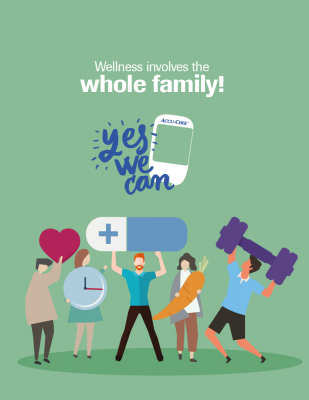How Parents with Diabetes Can Make Their Wellness a Family Priority
For many of us, diabetes is a family affair. Especially when a parent has diabetes, managing the disease with physical activity and healthy food choices can impact every member of the family. This World Diabetes Day, we’re thinking about this as an opportunity to explore the ways diabetes can actually help the entire family get healthy. What do you do when your kids want pizza but you know your blood sugar has been high today? Or when you need to burn some energy but you can’t get your kids to get off the couch and go to the park with you? As a parent managing diabetes, you have an opportunity to model positive choices that can...
Read MoreCarb Counting Exchanges
The truth about carbohydrates and diabetes The myth: If you have diabetes, you can't eat sweets or sugar. The truth: A food doesn't have to be sweet or sugary to raise your blood sugar. Anything with carbohydrates will affect your blood glucose, whether it's from white potatoes, pasta, bread or (insert local sweets here…jelly babies / lollies / strawberry laces).1 Of course, different foods may affect you differently. Why? Eating protein, fat or fiber along with your carbohydrates may slow the absorption of the carbohydrates into your system. That's why...
Read MoreThe Future of Diabetes Treatment
High-tech to zero-tech: The future of diabetes treatment Diabetes care has come a long way in just a few decades—after all, the first insulin pump was introduced in 1963, and fingerprick tests for personal blood glucose monitoring have only been around since the mid-1980s. So what's next? In development: Automating insulin delivery—the artificial pancreas Taking insulin pumping to the next level, an artificial pancreas is being tested that combines a continuous glucose monitor, insulin pump and glucagon pump (should blood glucose go too low), all managed by a smartphone. The goal is to...
Read MoreConfused about Diabetes? Not Anymore...
DISCLAIMER: By providing information to Marham via this affirmation, participants hereby agree to the terms & conditions and allow, authorize, permit and give consent to record, capture, save the information in their customer databases or on third-party servers or cloud and use the same for internal & marketing purposes in the manner that Marham & Roche may deem fit.
Read MoreManaging Diabetes Complications: Dental and Gum Care
People with diabetes are more than twice as likely to have gum disease as people without diabetes. Both gum disease and gum infection are common complications of diabetes. In fact, nearly one-third of people with diabetes have severe periodontal disease.1 Regular dental checkups and good dental care at home can reduce dental problems. Types of Problems In addition to tooth decay and gum disease, you may experience these other problems that occur more often in people with diabetes: Thrush (oral candidiasis) is a fungal infection in the mouth that causes white or red spots on the...
Read MoreManaging Diabetes Complications: Skin Problem and Skin Care
Ways to keep skin healthy Healthy skin isn't just about how you look, and people with diabetes shouldn’t take it for granted. When there's too much glucose in your bloodstream, your body will try to flush it away, losing moisture in the process. As a result, people with diabetes tend to have dry skin. Much of a diabetes skin care regimen, then, revolves around replenishing that moisture. High blood glucose levels can affect your skin in several ways: loss of fluids (dehydration) due to more frequent urination can make your skin dry skin may become extra dry, itchy or cracked ...
Read MoreHow and Why to Get a Good Night’s Sleep
Why sleep is important for people with diabetes When you are getting enough sleep, you may find that you have an easier time controlling your blood sugar. You’ll be more alert during the day, have more energy, less stress, and an overall better mindset for monitoring and managing your diabetes. Consider what happens when you don’t get enough sleep. In addition to other things that may interfere with your sleep like schedule changes or stress, people with diabetes can have potential complications with sleep. Both high and low blood sugar levels can interrupt your sleep. People with type 2 diabetes...
Read MoreHow to Talk to Your Doctor
Whether you’ve been living with diabetes for years or you’re newly diagnosed, communicating with your healthcare team is one of the best things you can do. If you’re nervous about opening up to your doctor or pharmacist, there are some good reasons to conquer these fears. Less communication leads to measurable increases in your stress, anxiety, and possible depression. It also leads, inevitably, to less frequent and less successful diabetes management.1 Since communicating with your healthcare providers is proven to be good for your health, here are some guidelines for starting the conversation and keeping it...
Read MoreHow to Travel with Diabetes
Having diabetes adds complexity to planning a well-deserved holiday. Changing your schedule, time zones, increased activity, eating on-the-go or new foods can affect your health. You’ll want to be ready for anything. But don’t stress! We’re here to make it easy, with a review of everything you’ll need for hitting the roads, skies, seas, or rails. Make a doctor’s appointment If your trip is going to last longer than a day or two, make an appointment with your doctor or pharmacist a few weeks before you leave. Let them know your travel plans, and ask if they have any concerns or...
Read MorePages
Carb Counting Exchanges
The truth about carbohydrates and diabetes The myth: If you have diabetes, you can't eat sweets or sugar. The truth: A food doesn't have to be sweet or sugary to raise your blood sugar. Anything with carbohydrates will affect your blood glucose, whether it's from white potatoes, pasta, bread or (insert local sweets here…jelly babies / lollies / strawberry laces).1 Of course, different foods may affect you differently. Why? Eating protein, fat or fiber along with your carbohydrates may slow the absorption of the carbohydrates into your system. That's why...
Read MoreThe Future of Diabetes Treatment
High-tech to zero-tech: The future of diabetes treatment Diabetes care has come a long way in just a few decades—after all, the first insulin pump was introduced in 1963, and fingerprick tests for personal blood glucose monitoring have only been around since the mid-1980s. So what's next? In development: Automating insulin delivery—the artificial pancreas Taking insulin pumping to the next level, an artificial pancreas is being tested that combines a continuous glucose monitor, insulin pump and glucagon pump (should blood glucose go too low), all managed by a smartphone. The goal is to...
Read MoreConfused about Diabetes? Not Anymore...
DISCLAIMER: By providing information to Marham via this affirmation, participants hereby agree to the terms & conditions and allow, authorize, permit and give consent to record, capture, save the information in their customer databases or on third-party servers or cloud and use the same for internal & marketing purposes in the manner that Marham & Roche may deem fit.
Read MoreManaging Diabetes Complications: Dental and Gum Care
People with diabetes are more than twice as likely to have gum disease as people without diabetes. Both gum disease and gum infection are common complications of diabetes. In fact, nearly one-third of people with diabetes have severe periodontal disease.1 Regular dental checkups and good dental care at home can reduce dental problems. Types of Problems In addition to tooth decay and gum disease, you may experience these other problems that occur more often in people with diabetes: Thrush (oral candidiasis) is a fungal infection in the mouth that causes white or red spots on the...
Read MoreManaging Diabetes Complications: Skin Problem and Skin Care
Ways to keep skin healthy Healthy skin isn't just about how you look, and people with diabetes shouldn’t take it for granted. When there's too much glucose in your bloodstream, your body will try to flush it away, losing moisture in the process. As a result, people with diabetes tend to have dry skin. Much of a diabetes skin care regimen, then, revolves around replenishing that moisture. High blood glucose levels can affect your skin in several ways: loss of fluids (dehydration) due to more frequent urination can make your skin dry skin may become extra dry, itchy or cracked ...
Read MoreHow and Why to Get a Good Night’s Sleep
Why sleep is important for people with diabetes When you are getting enough sleep, you may find that you have an easier time controlling your blood sugar. You’ll be more alert during the day, have more energy, less stress, and an overall better mindset for monitoring and managing your diabetes. Consider what happens when you don’t get enough sleep. In addition to other things that may interfere with your sleep like schedule changes or stress, people with diabetes can have potential complications with sleep. Both high and low blood sugar levels can interrupt your sleep. People with type 2 diabetes...
Read MoreHow to Talk to Your Doctor
Whether you’ve been living with diabetes for years or you’re newly diagnosed, communicating with your healthcare team is one of the best things you can do. If you’re nervous about opening up to your doctor or pharmacist, there are some good reasons to conquer these fears. Less communication leads to measurable increases in your stress, anxiety, and possible depression. It also leads, inevitably, to less frequent and less successful diabetes management.1 Since communicating with your healthcare providers is proven to be good for your health, here are some guidelines for starting the conversation and keeping it...
Read MoreHow to Travel with Diabetes
Having diabetes adds complexity to planning a well-deserved holiday. Changing your schedule, time zones, increased activity, eating on-the-go or new foods can affect your health. You’ll want to be ready for anything. But don’t stress! We’re here to make it easy, with a review of everything you’ll need for hitting the roads, skies, seas, or rails. Make a doctor’s appointment If your trip is going to last longer than a day or two, make an appointment with your doctor or pharmacist a few weeks before you leave. Let them know your travel plans, and ask if they have any concerns or...
Read More








